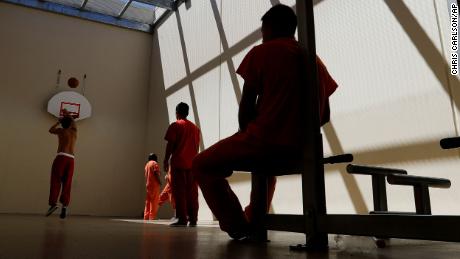(CNN)There are nearly 40,000 people in ICE custody across the United States. And there's a big question looming as the novel coronavirus spreads.
What will happen if there's an outbreak inside one of Immigration and Customs Enforcement's detention facilities, which have long faced criticism for how they handle even routine medical care?
ICE says there aren't any confirmed coronavirus cases at its detention facilities -- and that protecting the health and safety of those in its custody is one of the agency's top priorities.
The White House is asking Congress to boost ICE's budget so the agency can increase its quarantine capacity. Immigrant advocacy groups are pushing for ICE to release detainees now, before it's too late. And immigrants held in at least one family detention facility say they don't feel safe.
As this complex and fast-moving situation evolves, here are some of the key developments to watch:
ICE has put social visits on hold
As part of its efforts to stop coronavirus from spreading, the agency recently said it was temporarily suspending social visitation at ICE facilities "as a precautionary measure" -- meaning family members, friends and advocates who used to be able to visit detained loved ones in person can't anymore, at least for now.
That means one of the few windows in to a vast detention system that's often hidden from public view is closed. And some detainees are scrambling to come up with funds to make calls so they can stay in touch with their families. Amilcar Valencia, executive director of El Refugio, which hosts regular volunteer group visits at the Stewart Detention Center in South Georgia, says his organization is now working to raise money to help detainees call their loved ones. But something important is lost, he says, when visitors can't meet with detainees.
"Just being present there sends a message that people are not forgotten. They are not alone. They can see that there's people from the outside there, and it brings a level of accountability for staff and for ICE as well," he says. "Now that's not happening. We don't have that contact with people, and we don't have that direct connection, and we might lose that direct information that we get from them."
The White House wants to boost ICE's budget to expand quarantine capabilities and fund more deportation flights
The White House is asking Congress to give ICE $249 million more as part of its emergency coronavirus funding request. This is how the White House says the money would be spent, according to the funding request that was sent to lawmakers Tuesday night:
ŌĆó Converting four facilities into dedicated quarantine facilities on the southern border and provide enhanced sanitation and janitorial services.
ŌĆó Increasing the number of migrants in its Alternatives to Detention Program, which allows the agency to keep tabs on immigrants released from custody with things like ankle monitors and regular check-ins. "This would allow ICE to minimize the risk of further exposure to detainees and prevent transmission within the detention system," the budget request says.
ŌĆó Funding for more charter aircraft for the division known as ICE Air, which coordinates deportation flights. "With fewer commercial flight options, ICE charter aircraft are needed to continue repatriating aliens ordered removed and reduce the need for additional beds," the request says.
ŌĆó Providing personal protection equipment for ICE staff
Advocacy groups are calling for ICE to release detainees
While there aren't any confirmed cases of the novel coronavirus in ICE detention, we've heard about quarantines and outbreaks of other viruses in these facilities many times before.
And for years advocacy groups have warned that conditions in ICE custody are detrimental to detainees' health -- allegations that ICE has repeatedly denied.
Now a number of human rights organizations and immigrant advocacy groups are calling for ICE to release detainees. Some are asking for the agency to release detainees with underlying medical conditions. Others, like the Detention Watch Network, are pushing even further, saying all detainees should be let out.
In a federal lawsuit filed this week, the American Civil Liberties Union asked a judge to order ICE to release nine detainees from the Tacoma Northwest Detention Center near Seattle.
"Our experts have said it is really just a matter of time, it's perhaps inevitable that Covid 19 will reach the detention center, and when that does happen, the effects will be certain disaster. ... Everything that we know about detention conditions even under the best of circumstances will not help people who are at serious risk of illness and death," says Eunice Cho, senior staff attorney at the ACLU's National Prison Project.
The bottom line, advocates argue: ICE has the discretion to release people from custody, and now is the time to do it.
"This is just a really dire and critical situation," says Lorilei Williams, a senior staff attorney with the Southern Poverty Law Center's Southeast Immigrant Freedom Initiative. Along with other organizations, the SPLC sent a letter to ICE field office directors and wardens at detention facilities this week calling for detainees to be released.
Asked for a response to the ACLU's lawsuit and other efforts to push the agency to release detainees, ICE said it doesn't comment on pending litigation.
A spokeswoman referred questions to the site where ICE is posting coronavirus updates, which describes how the agency plans to mitigate the spread of the virus.
"Detainees who do not have fever or symptoms, but meet CDC criteria for epidemiologic risk, are housed separately in a single cell, or as a group, depending on available space," the website says.
Immigrants in detention 'feel like sitting ducks'
RAICES, a Texas-based immigrant advocacy organization, says it's intensifying its efforts to document growing fears that detainees are sharing with its lawyers.
"They're really concerned. They see what's on TV. And they hear the President saying don't be together in groups of 10 or more, that events of 50 or more people are being canceled. And they look around and see they're in close quarters with people, with staff coming in and out of the detention center daily. And they feel like sitting ducks," says Andrea Meza, director of RAICES' family detention services program.
Those concerns were clear in several declarations RAICES shared with CNN. According to RAICES, the statements were obtained by the organization's lawyers this week from detainees at the Karnes County Residential Center, a facility about an hour from San Antonio, Texas, where hundreds of families in ICE custody are held. CNN hasn't independently verified the allegations in the detainees' statements.
"I am very afraid to be detained with something like this going on. We do not get good healthcare here in Karnes. With all of these people in one place, we all get sick at the same time," one detainee's statement said. "This thing is very sensitive, and sickness spreads fast in Karnes. We will all die in here. If it comes here, we are doomed. Lack of medical care will kill us."
Several detainees' statement suggested soap was in short supply at the facility.
"The detained families clean the rooms, the patio, the kitchen, everywhere. The officers do not clean the center. The families just receive a broom and a mop with water. They do not give us soap or disinfectant to disinfect," another detainee said. "We are forgotten. We are human beings. No one here is properly disinfected. We need to be freed from this place."
ICE says it spends millions on medical care for detainees
Asked about the allegations, ICE said there's plenty of soap at Karnes, adding that residents should communicate with staff and case managers if they need more.
An agency spokeswoman said comprehensive medical care is provided to everyone in ICE custody and pointed to a 2017 Department of Homeland Security inspector general's report that described family detention facilities as "clean, well-organized, and efficiently run."
"ICE takes very seriously the health, safety and welfare of those in our care. ... Pursuant to our commitment to the welfare of those in the agency's custody, ICE spends more than $269M annually on the spectrum of healthcare services provided to those in our care," she said.
The private prison company that operates the family detention facility says the detainees' allegations are unfounded, noting that it's been taking steps to address the risks of coronavirus at all its facilities and holding town hall meetings with detainees at Karnes.
"We strongly reject these unfounded allegations, which we believe are being instigated by outside groups with political agendas," the GEO Group said in a statement.
"Consistent with all of our ICE facilities, the Karnes County Residential Center provides access to regular handwashing with clean water and soap in all housing areas and throughout the facility; provides 24/7 access to healthcare; has approximately double the number of healthcare staff, compared to correctional facilities; and is equipped with Airborne Infection Isolation Rooms," the statement said.
"We take our responsibility to ensure the health and safety of all those in our care and our employees with the utmost seriousness, and we reject efforts by outside groups to advance politically-motivated agendas in the face of the unprecedented health crisis facing our country."







